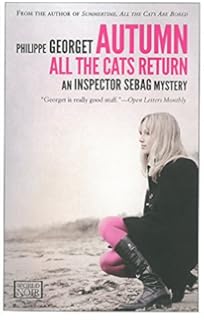 My favorite mysteries are the ones that expose me to a different world. That's something I get with the Gilles Sebag series, which began with Summertime, All the Cats Are Bored (see review here), and is followed up by Autumn, All the Cats Return. Sebag is a homicide inspector in Perpignan, in France's Mediterranean south, just across the Pyrenées from Spain. Perpignan is a center of the Catalan region and the reader has the pleasure of being exposed to both French and Catalan language, food and culture.
My favorite mysteries are the ones that expose me to a different world. That's something I get with the Gilles Sebag series, which began with Summertime, All the Cats Are Bored (see review here), and is followed up by Autumn, All the Cats Return. Sebag is a homicide inspector in Perpignan, in France's Mediterranean south, just across the Pyrenées from Spain. Perpignan is a center of the Catalan region and the reader has the pleasure of being exposed to both French and Catalan language, food and culture.In this new book, the reader's cultural and historical horizons are broadened even further by the book's main plot, which is the murderous targeting of Perpignan residents who, back in the 1960s, were Pieds-Noirs, French residents of Algeria, during the bloody fight for independence.
French President Charles de Gaulle reached a cease-fire agreement with the Algerian independence forces, which outraged a rogue group of French army officers, who formed a guerrilla force called the Organisation de l’Armée Secrète, or OAS. The OAS brutally attacked their opponents, hoping to terrorize them into acquiescence with continued French rule. Despite the appalling numbers they killed, they were unsuccessful and most Algerian residents with French ties fled to France.
 |
| Corpses in the streets were commonplace during the Algerian war for independence |
At the same time, Sebag is anxious to help his grieving teenage daughter by conducting an unofficial investigation of the death of her school friend, who was on his scooter when he was struck by a delivery van. The cop assigned to the investigation isn't known for his work ethic, and Gilles wants to make sure his daughter and the dead boy's family know exactly what happened.
 |
| Perpignan |
To appreciate this series, I think you need to have a strong interest in reading books set in unfamiliar locales. You must also enjoy a long book with a deliberate pace and an often melancholy tone. The book includes the Victor Hugo quotation "Melancholy is the happiness of feeling sad," and that's an apt comment on the book's own style.
So glad you're reviewing again, Sister! It's been a long hot summer without any posts. Enjoyed the Georget and have ordered the other two you reviewed this week. Thanks!
ReplyDeleteThanks, Betsy. I'm really glad to hear from somebody else who liked the Georget. I think everything about him is different; characterization, pacing, setting.
ReplyDeleteHave you read anything recently that you'd particularly recommend?
Just finished the latest Margaret Maron, Long Upon the Land, and really liked it. Also Martin Walker's latest in the Bruno series, The Patriarch. I've been loving Andrea Camilleri's Montalbano series, too--started at the start and am about to order The Paper Moon (2008). So many books, so little time!
ReplyDelete